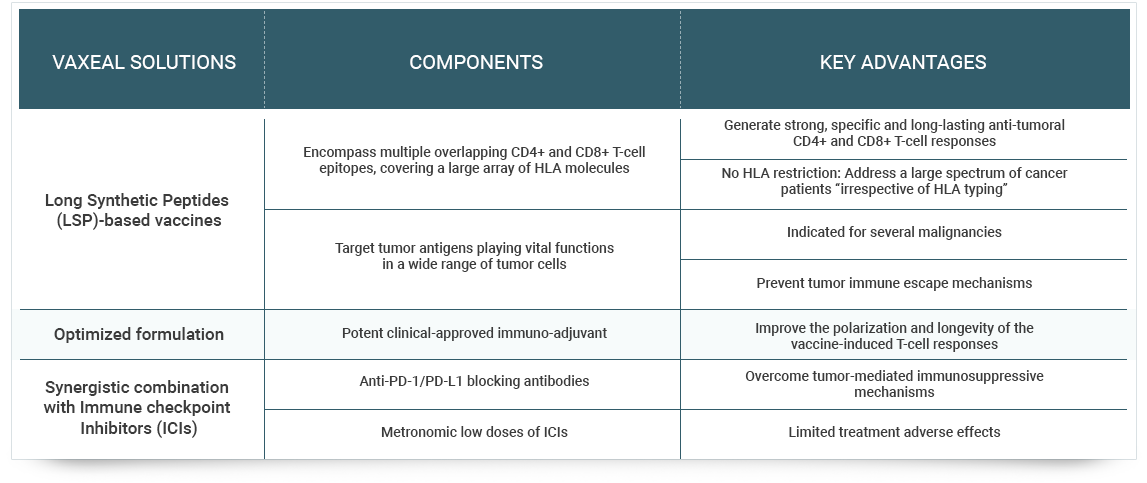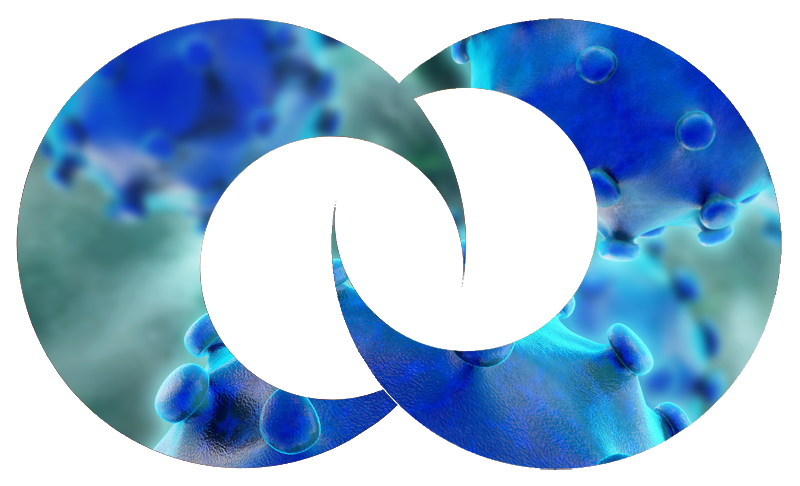Vaxeal’s core expertise in vaccine design, antigen formulation, delivery systems and immuno-modulatory drugs has allowed the management team to develop the optimal and innovative combined strategy for the design of cancer immunotherapies enabling to overcome the safety and efficacyissues of current cancer immunotherapy approaches.



Vaxeal’s innovative cancer immunotherapies can generate robust, specific, and long-term anti-tumoral T-cell responses in the broad majority of patients, irrespective of individual HLA typing, while overcoming the limitations arising from conventional cancer vaccines, as well as tumor immune escape mechanisms. They address a large spectrum of cancer patients as they target broadly expressed tumor antigens, which cover almost all solid tumors.
The company’s strategy also overcomes tumor-induced immunosuppressive mechanisms developing in some tumor microenvironments that can greatly limit the therapeutic efficacy of other immunotherapeutic cancer vaccines. This is achieved through synergistic fixed combinations with immune checkpoint Inhibitors (ICIs). Suchfixed combinationenables to boost the induction and efficacy of the anti-tumor immune responses induced with our LSPs and thus to improve their clinical efficacy in some cancer indications while limiting treatment side effectsinduced by ICIs thanks to the use of metronomic low doses ICIs.

Vaxeal target selection was based on expression and tumor cell vital functions.
Survivin and Cyclin B1 are relevant targets as they are undetectable or transiently expressed in most normal adult tissues, while they are over-expressed in most human cancers, and play multiple vital functions in tumors. Both targets are associated with a poor prognosis.

Long Synthetic peptides (LSPs) are very attractive for the development of cancer immunotherapies as they can provide multiple selected CD4 and CD8 T-cell epitopes covering a full array of HLA alleles (no HLA- restriction), thereby enabling the generation of both robust and balanced CD4+ and CD8+ T-cell responses in polymorphic human populations, while overcoming induction of immune tolerance. In addition, LSPs have the strong advantage of being safe and easy to manufacture compared to “biological vaccines” created from living organisms.
In over 20 clinical trials, in which Vaxeal executives participated, LSP-based vaccines were found to be safe, well tolerated, and showed promising clinical efficacy in patients with pre-neoplastic lesions or with solid tumors.
The efficacy of the LSP based immunotherapies is further increased by their formulation with new adjuvants, and fixed combination with antibodies that modulate tumor-induced immune suppression (Immune Checkpoint Inhibitors).

Promiscuous CD4+ T-cell epitopes correspond to sequences able to induce an immune response in multiple donors. VAXEAL chose to develop immunotherapies incorporating both multiple promiscuous CD4+ T-cell epitopes and CD8 T-cell epitopes restricted to various HLA class I molecules, to activate both tumor antigen specific CTLs and CD4+ T-cell responses in a wide range of cancer patients. Such vaccines have been found to be more effective than vaccines that only target CD8+ T-cell responses as CD4+ T-cells play a crucial role in induction and maintenance of effective and long-term anti-tumor CTL responses and humoral responses, and can have direct anti-tumor effects.
Accordingly, cancer vaccines develop by VAXEAL will have a significant advantage compared with cancer vaccines only focusing on a CD8+ T-cell responses, or incorporating generic helper peptides, which produce non-specific helper support.

A central aim of therapeutic cancer vaccines is to generate effective anti-tumor immunity in cancer patients leading to elimination of tumors and long-lasting protection against relapses. However, cancer vaccines are not suit to overcome tumor-induced immunosuppressive mechanisms, notably the overexpression of immune checkpoint molecules (such as cytotoxic T lymphocyte–associated antigen 4 (CTLA-4) and the programmed cell death protein 1 pathway (PD-1/PD-L1)) inducing T-cell anergy in the tumor microenvironment, and thus representing a substantial barrier for successful immunotherapy.
Vaxeal’s LSP-based cancer vaccines combined with low doses of Immune Checkpoint Inhibitors (ICIs), selected according to the clinical indication.